Know Yourself. Choose Yourself. Give Yourself.
- Charity Goodwin

- Aug 30, 2022
- 2 min read
Updated: Sep 2, 2022
We are in the people business.
It can become so easy to forget ministry is about people. Our to-do lists look like tasks list and we can focus on the things to be done rather than the people with whom to be in relationship. (There are also those folks who focus on relationships to the detriment of doing tasks, but that’s a different blog post).
This next series of posts will be about relating to people using emotional intelligence. Emotional intelligence is simply being smarter with feelings. I know that sounds oxymoronic to some folks because feelings are not valued as smart, worthy of engaging, or useful. We’re going to unpack some of that so that you can lead with less drama (internal and external), create positive momentum toward God’s vision for your ministry, and frankly so that you can love God, yourself and the people you lead with a healthy and fierce love.
You can learn to be smart with feelings. To best understand how to do so the KCG model is used. KCG stands for Know Yourself. Choose Yourself. Give Yourself. The model is a wellness model that helps you to function with life’s challenges. It can benefit you at church and at home.
The model is also integrated. It blends emotional and rational data so we can make better decisions, drive effective results, and have healthier relationships. Integration looks at the whole person-not one aspect. The whole being head, heart, and hands.
The model is learnable. You can grow into it. The KCG model through assessments measures many things. Among them are Effectiveness, Relationships, Quality of Life, Wellbeing.
The scientifically grounded skills of emotional intelligence are highly predictive of these outcomes – they seem to move together.
Take a moment here. Looking at those four areas effectiveness, relationships, quality of life and wellbeing. How would you rate yourself in each area on a scale of 1-10?
If you suspect you have areas below an 8, Consider doing a full assessment so that you can continue strengthening your ministry.
"We want to believe we are thinking beings who sometimes think, when we are feeling beings who sometimes think." -Brene Brown
You might need to read that again.
Behaviors of people with lower EQ (emotional intelligence) look like blaming, resenting, attacking, judging, stonewalling and excluding. However those with higher EQ tend to bounce back, listen, empathize, risk, flex and include.
Those with higher EQ have 22 percent greater performance. So while sometimes this work is seen as soft skills and somehow not impactful, the opposite is true. Practicing this soft skill yields hard-hitting results and increased positive impact in your organization among your team and parishioners.
The KCG model can be practiced by asking the following questions.
Know Yourself: What am I feeling?
Choose Yourself: What options do I have?
Give Yourself: What do I want? Or value?
Actions Brings Clarity: Consider a challenge or a celebration in your ministry. Now ask the previous questions. That's practicing EQ. Notice what was hard? Easy?
If you want to take this deeper, sign up for the EQ mini course HERE to get instant access to specially curated, short and power-packed videos, a high-level assessment of your KCG and a one on one debrief to help you take action in at least one area.




Comments